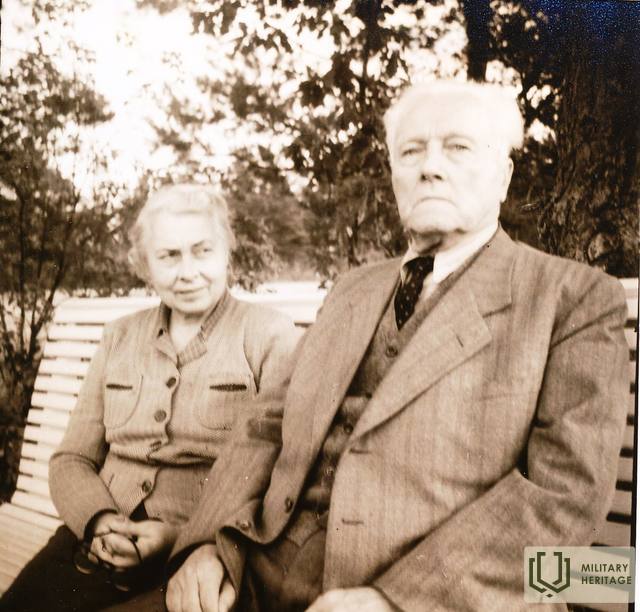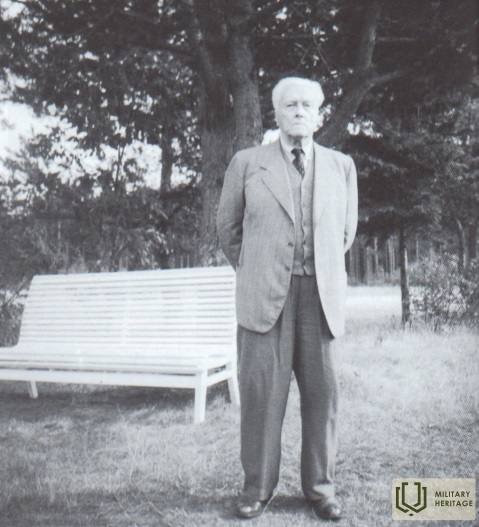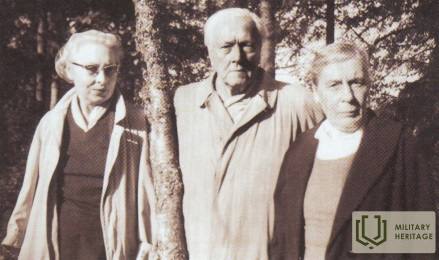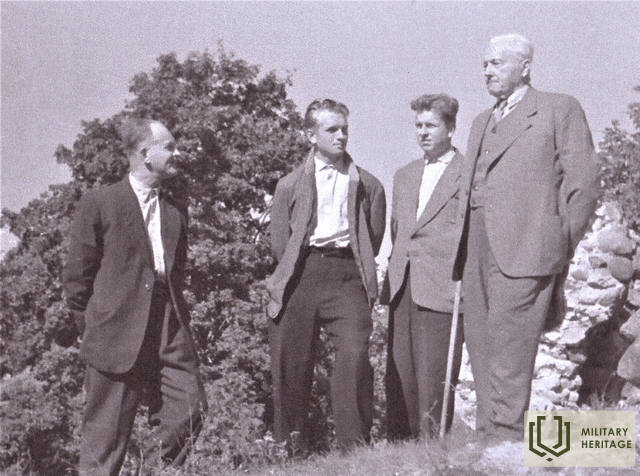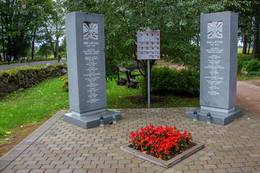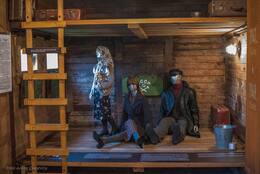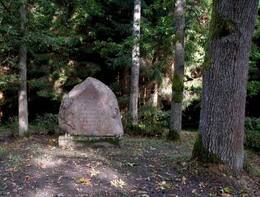Generolo Janio Baložo gyvenimas po grįžimo iš tremties
Kai 1940 m. rusai bandė išspausti iš Latvijos vyriausybės palankią karinės bazės sutartį, kuri būtų beveik neįmanomą Latvijos armijos gebėjimą pasipriešinti Raudonajai armijai, generolas J. Balodis bandė gauti kai kurias sutarties pataisas. Tačiau tai nepavyko. Tačiau generolo priešininkai pasinaudojo šia aplinkybe, kad vėliau J. Balodį paverstų beveik išdaviku. Po konflikto su ministru pirmininku ir valstybės ministru K. Ulmaniu generolas 1940 m. balandžio 5 d. buvo atleistas iš karo ministro pareigų. Tuomet J. Balodis nusprendė dalyvauti Saeimos rinkimuose iš Demokratinio bloko, tačiau nieko iš to neišėjo, nes rinkimuose buvo leista dalyvauti tik vienam sąrašui – komunistų kandidatų sąrašui. Latvija tapo 14-ąja sovietine respublika.
1940 m. liepos 31 d. einantis ministro pirmininko pareigas Vilis Lācis asmeniškai parašė įsakymą išsiųsti buvusį Latvijos karo ministrą generolą J. Baložą ir jos šeimą iš Latvijos Tarybų Socialistinės Respublikos. Tą pačią dieną generolas ir jo žmona buvo suimti ir išvežti į Syzranę Rusijoje. Iki 1952 m. abu sutuoktiniai kalėjo įvairiuose Rusijos kalėjimuose. Tik 1952 m. įvyko „komedija“ – teismo procesas, kuriame net nedalyvavo kaltinamieji, ir J. Balodis, ir jo žmona Elvīra Balodi buvo nuteisti 25 metams kalėjimo už „tėvynės išdavystę“. 1954 m., po 13,5 metų kalėjimo, J. Balodis ir E. Balodis buvo amnestuoti, tačiau jie turėjo likti Vladimire. Po to ir Elvīra, ir Jānis kelis kartus nelegaliai atvyko į Latviją, tačiau vėl buvo suimti ir etapais grąžinti į Vladimirą. Tik 1960 m. pavasarį, pateikus 11 prašymų sovietų vyriausybei Maskvoje, abiem Baložams leista legaliai grįžti į Latviją. Jiems pavyksta užsiregistruoti pas Baložo pusseserę ponią Ozolą Rygoje, buvusiame Sinkos name Tērbato gatvėje. Abu turi gyventi tik iš 80 rublių pensijos.
J. Balodis su žmona vasaras leisdavo Saulkrastuose nuo 1959 iki 1965 metų, o paskutinius ketverius metus nuomojosi pusę nedidelio vasarnamio gražioje, vaizdingoje vietoje, miško pakraštyje, netoli Ķīšupytės intako Pupaļurgos, dabar Krastos gatvė 10. Šiuo metu čia driekiasi asfaltuotos gatvės ir namų eilės, tačiau anuomet aplink namą plytėjo pievos, jose ganėsi karvės ir avys. Šis vasarnamis pastatytas 1960 metais ir priklausė Maksimui ir Martai Šiboms. Savininkai su sūnumi ir uošve gyveno antrame aukšte, o generolas J. Balodis su žmona Elvira ir ūkio valdytoja Marija, kuri taip pat buvo laikoma šeimos nare, ilsėjosi pirmame aukšte. Čia jie turi svetainę ir miegamąjį.
Ne visi tuo metu drąsiai ėmė globoti iš tremties grįžusius žmones, jau nekalbant apie generolą! Generolas Jānis Francis, tuo metu gyvenęs Saulkrastuose, Alfrēda Kalniņa gatvėje 4, padėjo generolui Balodžiui susirasti vasaros rezidenciją. Buvęs užsienio reikalų ministras Muntersas su žmona dažnai lankydavosi Balodžio namuose Saulkrastuose.
Iš Martos Šibasės atsiminimų laikraštyje „Mājas Viesis“ sužinome, kad ponia Baloža Elvyra mėgo gėles, sodindavo jas aplink namus ir prižiūrėdavo. Baložai taip pat mėgo rinkti grybus, pušyne rinkdavo baravykus, vėdrynus, beržų lapus. Jie išvirdavo skanią grybų sriubą, kuri ypač patiko poniai Baložai.
Poilsiaudamas Saulkrastuose, generolas daug klausosi radijo, ypač vakaro žinių. Jiedu kartu taip pat skaito knygą: vyras skaito garsiai, o žmona varto puslapius.
1961 ir 1962 metų vasaromis generolas kartu su draugais aplankė gimtąją Trikatą, keliavo po Ventos ir Dauguvos upių pakrantes, aplankė Staburagus ir generolo O. Kalpako atminimo vietą „Airytės“. Jis taip pat keliavo į kelių dienų kelionę į Vilnių ir Trakus Lietuvoje.
1963 m. kovo 8 d. J. Balodis pateko į avariją. Gyvendamas Rygoje, jis ryte nuėjo į kioską pasiimti laikraščio. Nukrito slidžioje gatvėje ir susilaužė koją. Gydymas ligoninėje truko iki liepos vidurio. Tuo metu generolui taip pat pradėjo kilti problemų su kepenimis. Ligos metu jis labai ilgėjosi Saulkrastų, kur galėjo sušilti saulėje ir atsipalaiduoti. Tai jam pavyko padaryti tik antroje vasaros pusėje.
J. Balodis mirė 1965 m. rugpjūčio 8 d. Saulkrastuose, buvo perkeltas iš namo Krastos gatvėje 10 ir palaidotas II Mežos kapinėse.
Nepaisant sovietų valdžios bandymų nuslėpti informaciją apie Baložo laidotuves, keli tūkstančiai žmonių apsupo Baltąjį generolą jo paskutiniųjų apeigų metu.
Straipsnis „Generolui Jāniui Balodiui šiemet sukanka 135 metai“, autorė: Dagnija Gurtiņa, 2016-02-09 Saulkrastų miesto tarybos žinios
Susijusios temos
Susijusios vietos
Lāčplėsio karinio ordino generolų ir riterių atminimo vietos Trikātos valsčiuje
Atminimo stela yra šalia Trikatos kapinių koplyčios.
Trikātos kapinėse saugomas trijų iškilių Latvijos generolų – Roberto Dambīčio, Kārlio Gopperso ir Jānio Balodžio – atminimas. Trikātos kapinėse palaidotas ir visų šių generolų mokytojas Jēkabs Mūrnieks, kuriam 1928 metais palaidojimo vietoje buvo pastatytas paminklas iš travertino, sukurtas pagal Kārlio Zāle pavyzdį.
Lačplėsio karinio ordino generolai ir riteriai kasmet pagerbiami fakelų procesijomis į Trikatos kapines, kur yra dvi atminimo stelos, kuriose iškalti 17 su Trikatos parapija susijusių Lačplėsio karinio ordino riterių vardai.
Stela buvo atidengta 2018 m. lapkričio 11 d.
Vaizdo įrašas apie Lāčplės karo ordiną ir ordinų rinkinį , priklausiusį generolui Jāniui Balodiui.
Trėmimams naudotas galvijinis vagonas – muziejus Skrundos geležinkelio stotyje
1941 m. birželio ir 1949 m. kovo mėn. trėmimams atminti Skrundos geležinkelio stotyje pastatytas atminimo akmuo ir keturašis vagonas, kuris taip pat tarnauja kaip trėmimams skirtas muziejus. Tai pirmasis vagono tipo muziejus Latvijoje, kuriame nuolat eksponuojamos iš Skrundos stoties ištremtų žmonių nuotraukos, laiškai, atsiminimai, dokumentai ir įvairūs daiktai. Skrundos stotis buvo tremtinių surinkimo vieta ir viena iš trijų regiono stočių, į kurią buvo atvežti žmonės iš Skrundos ir Kuldygos apylinkių. 1941 m. iš čia į Krasnojarsko kraštą Sibire buvo ištremta pirmojo atkurtos Latvijos Respublikos prezidento Gunčio Ulmanio šeima.
Deportacijų pagalba sovietai susidorojo su nacionalinių partizanų šalininkais ir tuo pačiu metu baugino likusius kaimo gyventojus, versdami juos stoti į kolūkius.
Atminimo akmuo generolo Janio Baložo brigados mūšio vietoje
Atminimo akmuo generolo Janio Baložo brigados mūšio vietoje yra miške netoli Rygos–Liepojos (A9) greitkelio, šalia Batarų namo.
Atminimo akmuo buvo atidengtas 1936 m. iškilmingoje ceremonijoje, kurioje dalyvavo tuometinis susisiekimo ministras B. Einbergas ir kiti aukšti Rygos pareigūnai bei Džūkstės parapijos visuomenė, minint 1919 m. kovo 22 d. čia įvykusį mūšį. Ant paminklo iškaltas užrašas: „Čia 1919 m. kovo 22 d. įvyko 1-osios atskirosios Baložių brigados mūšis, kuriame žuvo 10 ir buvo sužeisti 28 kareiviai.“
Mūšis vyko tarp Atskirosios Latvijos brigados ir 10-ojo sovietų Latvijos šaulių pulko, kuriame 90 procentų buvo latviai. Laisvės kovų metu tai buvo vienas iš tų mūšių, kuriuose latviai kovojo su latviais. Bolševikai buvo įsitvirtinę Batarų namuose. Jie pradėjo apšaudyti brigados kareivius, einančius Kalnciemo kryptimi. Ugniai stiprėjant, brigada išsidėstė kovai. Pagrindinė mūšio našta teko Atskirajai Studentų kuopai ir Latvijos nepriklausomybės batalionui. Mūšiui užsitęsus, studentų kuopos būrys ir naujai suformuota kapitono E. Graudinio kuopa, atlikdami apėjimo manevrą, miške susidūrė su priešu, kuris atliko panašų manevrą. Įnirtingoje kovoje, kuri kai kuriose vietose virto artima kova, priešas buvo nugalėtas. Tuo metu brigadai priskirta vokiečių Millerio baterija atidengė ugnį į Batarų namus. Po artilerijos ugnies brigada greita ataka išstūmė priešą iš jo pozicijų.
Laikraštis „Brīvā Zeme“ (1936 m. gegužės 18 d.) paskelbė buvusio kovotojo prisiminimus: „Brigadavos kavalerija ką tik buvo išjojusi į atvirą lauką, kai juos pasitiko smarki priešo ugnis. Po to tapo aišku, kad jie susiduria su labai stipriomis priešo pajėgomis. Batalionai, generolo J. Baložo įsakymu, išsidėstė ir pradėjo kovoti, įsitraukdami į artimą kovą, nes brigados kareivių durtuvai šį dviejų valandų mūšį pavertė spindinčia kalpakiečių pergale. Šis mūšis buvo labai svarbus, nes sulygino padėtį fronte, kuris tapo nesaugus dėl vokiečių, ir užtikrino, kad raudonųjų šaulių pulkai nebepatektų į Žiemgalos lygumą.“
Generolo J. Baložo brigada laimėjo mūšį, pralaimėdama 10 kareivių, tarp jų – Kārlį Baroną (1900.8.III – 1919.22.III), Dainų tėvo Krišjanio Barono anūką, palaidotą Rygos brolių kapinėse. Mūšyje žuvo 50 sovietinio Latvijos šaulių pulko kareivių.




